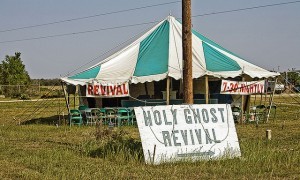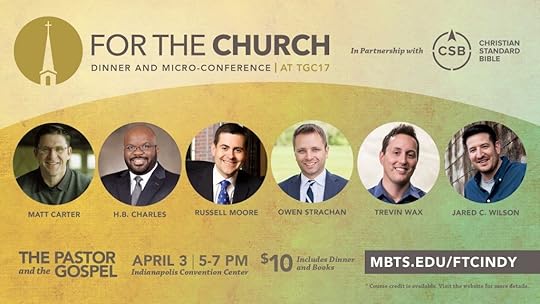Jared C. Wilson's Blog, page 21
March 30, 2017
Easy Like Friday Afternoon: A Manifesto on Hard-Believism
 “Enter ye in at the strait gate: for wide is the gate, and broad is the way, that leadeth to destruction, and many there be which go in thereat: Because strait is the gate, and narrow is the way, which leadeth unto life, and few there be that find it.”
“Enter ye in at the strait gate: for wide is the gate, and broad is the way, that leadeth to destruction, and many there be which go in thereat: Because strait is the gate, and narrow is the way, which leadeth unto life, and few there be that find it.”
— Matthew 7:13-14 (in the King’s English)
“When the disciples heard this, they were greatly astonished, saying, ‘Who then can be saved?’ But Jesus looked at them and said, ‘With man this is impossible, but with God all things are possible’.”
— Matthew 19:25-26
It is still scandalous to say what the Scriptures say, which is that no man who doesn’t take up his cross is worthy of Jesus (Mt. 10:38). Many are they who want to extrapolate from sola fide to something that is not fide at all. They assume oddly that because faith alone justifies, real faith may be alone, unaccompanied by works, or that the sum total of salvation is justification alone and not also sanctification.
We saw this in the relatively recent “Lordship salvation” debate, in which many solid Reformed brothers helpfully affirmed the classic doctrine of “faith alone” while also affirming what the Bible both says and implies: saved people are changed people. To have Jesus as Savior is to have him as Lord. It is not legalism to say the new birth begins a new life. Yes, we still battle the flesh—crucifying it daily—but this in itself is a change from the old life, in which we cared nothing about battling the flesh. We still have sin in us, but we are conscious of it, convicted about it, and concerned to be rid of it. This is not works salvation; this is the fruit of salvation.
Obeying the commands of God does not save us, but it is the way we prove saved. This is the testimony from Abraham onward to the new covenant. It is the testimony of James—So also faith by itself, if it does not have works, is dead (2:17)—and of Jesus himself—”If you love me, you will keep my commandments” (John 14:15).
What self-professing “easy-believists” think is that they are upholding the free gift of grace by insisting one can believe without actually changing, that one can have the benefits of Christ’s salvation without actually worshiping him as Lord, and some will charge the “hard-believists” with being scandalized by grace. This is because easy-believists are doctrinally dense and categorically confused. They say all one needs to be justified is belief—which is true—but they are hard pressed to define what belief is. They cannot explain how one can trust without, you know, actually trusting. Trust for the easy-believist becomes an idea, not an actuality. It is something intellectual, or less. The “faith” of the easy-believist means Hebrews 11 should consist of only ellipses. John Calvin says faith is an empty vessel, but it is held up to be filled. The easy-believist’s faith may be called a fog, except even a fog is visible.
Martin Luther ran up against this problem himself, writing in his Commentary on Romans:
Faith is not something dreamed, a human illusion although this is what many people understand by the term. Whenever they see that it is not followed either by an improvement in morals or by good works, while much is still being said about faith, they fall into the error of declaring that faith is not enough, that we must do works if we are to become upright and attain salvation. The reason is that when they hear the gospel they miss the point. In their hearts and out of their own resources they conjure up an idea which they call belief which they treat as genuine faith. All the same, it is but a human fabrication, an idea without a corresponding experience in the depths of the heart. It is therefore ineffective and not followed by a better kind of life.
Commenting on this, John MacArthur goes on to say about the easy-believist’s notion of faith, “It’s not faith at all. They just call it faith.” Luther again:
Faith, however, is something that God effects in us. It changes us and we are reborn from God. Faith puts the old Adam to death and makes us quite different men in heart, in mind and in all our powers. And it is accompanied by the Holy Spirit. Oh, when it comes to faith, what a living creative active powerful thing it is. It cannot do other than good at all times. It never waits to ask whether there is some good work to do, rather before the question is raised, it has done the deed and keeps on doing it. A man not active in this way is a man without faith. He is groping about for faith and searching for good works but knows neither what faith is nor what good works are. Nevertheless he keeps on talking nonsense about faith and good works. It is impossible indeed to separate works from faith just as it is impossible to separate heat and light from fire.
And there’s the key! Not only does the easy-believist hold to a faith that is essentially Jello, only less substantial, while claiming to hold more firmly to a scandalous grace, he also underestimates grace.
I am a hard-believist. I am a hard-believist because I take Jesus at his word when he says easy is the way to destruction and hard (or narrow, if you prefer) is the way to life. I am a hard-believist because I take him at his word when he says that with man, being saved is impossible. I am a hard-believist because I believe salvation isn’t easy: it requires the death of Christ. It requires new birth. (Anybody know what a baby has to do to be born?) It requires nothing short of spiritual intervention. It requires quickening, resurrection, cured blindness and healed deafness, a softened heart—none of which we can do for ourselves. We need radical intervention. We need the command of God, “Let there be light!” We are helpless to be saved. We simply can’t do it. Paul writes in Romans 8:7, “For the mind that is set on the flesh is hostile to God, for it does not submit to God’s law; indeed, it cannot.”
We require rescue. If it were easy to believe, more people would do it.
I am a hard-believist not because I think we have to do things to be saved, but because we can’t do things to be saved. I am a hard-believist not because I think life change is required for salvation but because life change is required of those who are saved. I am a hard-believist not because I deny grace, but because I affirm it. This is what I mean:
In the end, the essential trust here is not that our “life change” justifies us, but that those whom God justifies, he sanctifies. We trust that God is pleased to credit Christ’s perfect righteousness to our account, but that he is also pleased to actually make us righteous, to faithfully complete the work he began in us, to spiritually plant and grow righteousness in our lives. The Bible calls this fruit, and by this fruit we are known as Christians. This is not a denial of grace, but an affirmation of real grace, of the only grace there is, which is the grace that comes in the gospel that is power.
The grace by which we are saved does not stop at enabling some philosophical ghost we would like to call “faith”; it is the power by which we are saved and being saved (1 Cor. 15:1-2). Grace powers justifying faith, and grace powers corroborating good works. Grace powers new life.
The easy-believist, on the other hand, posits a de-powered grace, a grace effectual for a belief that requires no according action, a faith that needs no evidence, a new birth that leaves us stillborn. Their gospel is Sanka. It’s near-beer. Friends, don’t mess with that stuff. The free grace of God is transforming.
March 28, 2017
Success Disagrees with Christianity
 I am quite fond of the 2000 piece in The New Yorker by the late John Updike titled “The Future of Faith: Confessions of a Churchgoer”, especially this bit:
I am quite fond of the 2000 piece in The New Yorker by the late John Updike titled “The Future of Faith: Confessions of a Churchgoer”, especially this bit:
My father to the day of his death, more than twenty-five years later, served that church, in various capacities, while I escaped to college and beyond. He was the son of a minister, but he felt that his father had failed in the ministry, having lacked “the call” and the necessary energy. Where many fathers, some of them described in late Victorian novels, conveyed to their sons an oppressive faith that it was a joy to cast off, my father communicated to me, not with words but with his actions and mournful attitudes, a sense of the Christian religion as something weak and tenuous and in need of rescue. There is a way in which success disagrees with Christianity, and its proper venue is embattlement — a furtive hanging on in the catacombs, or at ill-attended services in dying rural and inner-city parishes. Its perilous, marginal, mocked existence serves as an image of our own, beneath whatever appearance of success is momentarily mustered. At any rate, I had no Oedipal motive to discard it; at college and then in New York City I found my way fitfully to Lutheran services, shunning deeper involvement but stealing away cleansed and lightened, and taking a certain contrarian pride in participating in ceremonies that, by the wisdom of the world, were profitless and irrational.
Bolding mine.
March 23, 2017
When You’ve Got a Bramble for a King
 The world of the book of Judges is a sordid, nasty, utterly broken place. Some of the most horrific accounts of sin detailed in the Bible are found in the book of Judges. We are told quite plainly: “In those days there was no king in Israel. Everyone did what was right in his own eyes” (Judges 14:7, 17:6). In Judges 9, the people of Israel are beginning to reap what they’ve sown in discord and disobedience. After the death of Gideon (referred to as Jerubbaal in Judges 9), the nation has descended into apostasy, and God’s judgment looms. But it is not as so often judgment in the guise of an invading army but more along the lines of what we see detailed in Romans 1:24, or Psalm 81:12—“ So I gave them over to their stubborn hearts, to follow their own counsels.”
The world of the book of Judges is a sordid, nasty, utterly broken place. Some of the most horrific accounts of sin detailed in the Bible are found in the book of Judges. We are told quite plainly: “In those days there was no king in Israel. Everyone did what was right in his own eyes” (Judges 14:7, 17:6). In Judges 9, the people of Israel are beginning to reap what they’ve sown in discord and disobedience. After the death of Gideon (referred to as Jerubbaal in Judges 9), the nation has descended into apostasy, and God’s judgment looms. But it is not as so often judgment in the guise of an invading army but more along the lines of what we see detailed in Romans 1:24, or Psalm 81:12—“ So I gave them over to their stubborn hearts, to follow their own counsels.”
Abimelech, who was a son of Gideon by one of Gideon’s concubines, saw an opportunity to fill a void in power, and making an appeal to his family for support, he made a shrewd and self-interested case for himself as a king. “Would you rather be ruled by seventy men?” he argued (Judges 9:2), referring to the totality of Gideon’s sons. “Or by one?” What ensued was a succession of hits that makes The Godfather look like Strawberry Shortcake. Using money from a house of Baal-worship, Abimelech hired seventy assassins. “Worthless and reckless fellows,” Judges 9:4 calls them. Together they murdered all of Abimelech’s brothers “on one stone” (9:5). All, that is, except one. The youngest, named Jotham, escaped.
The brazen act of murder, nearly sacrificial in its overtones, is certainly devil worship, whether explicitly or implicitly. The root of pride if left unchecked will grow into a murderous tree. Through this wicked use of force, Abimelech was made king.
We pick up the story here:
When it was told to Jotham, he went and stood on top of Mount Gerizim and cried aloud and said to them, “Listen to me, you leaders of Shechem, that God may listen to you. The trees once went out to anoint a king over them, and they said to the olive tree, ‘Reign over us.’ But the olive tree said to them, ‘Shall I leave my abundance, by which gods and men are honored, and go hold sway over the trees?’ And the trees said to the fig tree, ‘You come and reign over us.’ But the fig tree said to them, ‘Shall I leave my sweetness and my good fruit and go hold sway over the trees?’ And the trees said to the vine, ‘You come and reign over us.’ But the vine said to them, ‘Shall I leave my wine that cheers God and men and go hold sway over the trees?’ Then all the trees said to the bramble, ‘You come and reign over us.’ And the bramble said to the trees, ‘If in good faith you are anointing me king over you, then come and take refuge in my shade, but if not, let fire come out of the bramble and devour the cedars of Lebanon.’” (Judges 9:7-15)
Jotham’s story is a crypto-parable. His employment of trees and vines and fire are elemental to several of Jesus’s more prominent parables. Jotham includes three symbols of national flourishing that lay at the, for lack of a better word, root of Jesus’s own promises and warnings. They are the olive tree, the fig tree, and the grapevine. Each, personified by Jotham, is asked by the trees to come reign over them. In general, Jotham is indicting the people’s God-offending demands for a king. They should have no king over them but YHWH, yet still they stamp their foot. More specifically, however, there is a lesson to learn in each of the parable’s would-be rulers.
The trees ask the olive tree, renowned for its “fatness,” its abundance, because idolatrous people will easily be ruled by extravagance and consumption. Wanting to be ruled by the olive tree is making an idol of materialism, of riches. It is parallel to the New Testament’s “their god is their belly” (Philippians 3:19).
The trees next ask the fig tree to reign over them. The fig tree serves in the Jewish mythos as the national symbol of safety and security and of stability. We see this symbolically in the prophetic “shade” the fig tree offers (1 Kings 4:25, Micah 4:4). Remember also that it was with fig leaves that Adam and Eve sought to first cover their shame. The cry of the trees for the reign of the fig tree seeks ultimate hope in temporary safety and peace. It is the symbolic equivalent of the false prophets crying “Peace, peace” where there is no peace (Jeremiah 6:14, 8:11).
The trees next ask the vine to reign over them. The vineyard and its grapevines are symbols of national abundance and fruitfulness, of luxurious provision, and generally of God’s favor. Here the trees asking for the vine’s presence reveals the arrogant audacity of the people asking for God’s favor despite their idolatry! It is a foreshadow of Paul’s words in Romans 6:1: “Are we to continue in sin that grace may abound?” The trees—and the idolatrous nation detailed in the book of Judges—would say, “Heck yes!”
But of course God’s favor does not work in any of these ways. The cry for these kings goes unheeded. The olive tree, the fig tree, and the vine all decline the request made of them. Indeed, what we may gather is embedded in Jotham’s parable is that, a repentant nation focused on YHWH as their only hope and glory, might actually enjoy the abundance of the olive tree, the security of the fig tree, and the libation of the vine. That was the original point of these biblical symbols!
Jotham drills down into the heart of the matter. “Then all the trees said to the bramble, ‘You come and reign over us’” (Judges 9:14). The bramble is Abimelech. And the people are going to get what they ask for.
For what is a bramble? A dry, thorny bush. An invasive and offensive weed, really. Suitable only for the machete and the bonfire.
“Come, get under my shade,” the bramble calls. “I will take care of you.”
The bramble promises destructive fire if the trees will not comply. But it’s a trick. Like the devil tempting the Lord with the provision of bread or the security of the angelic helpers or the abundance of the nations, the promise belies that the fire is not outside his reign but inside. The threats of Abimelech draw the people in, where they are in the most danger.
Examined like this, we can see the gospel application in Jotham’s parable for us today. Our hearts are desperate for a king. We will make an idol of nearly everything, and indeed, the abundance of possessions and the security of comfort and the assumption of God’s favor for our self-righteousness are the most common. But God’s gifts are good gifts and terrible gods. In the end, if we will not serve God as God, we will find our refuge no refuge at all, but a house of brambles—dry and thorny and reserved for the fires of hell. Several of Jesus’s parables make the same point, and it is not for no reason that he curses the fig tree and tells stories about dead trees ready for the fire. His warning is Jotham’s, and vice versa.
We cry out for a king, and Jesus answers the call. For all who will trust him, he is eternal provision, everlasting security, and infinite favor. He is the vine (John 15:5); all else is bramble.
(This is a slightly edited excerpt from The Storytelling God: Seeing the Glory of Jesus in His Parables)
March 21, 2017
Wonder and Rationality in Calvinism (So-Called)
John Piper’s 2012 piece “The Sovereign God of ‘Elfland’ (Why Chesterton’s Anti-Calvinism Doesn’t Put Me Off)” puts so well into words something I’ve been trying to figure out how to write about for a while. A taste:
It is a great irony to me that Calvinists are stereotyped as logic-driven. For forty years my experience has been the opposite. The Calvinists I have known (English Puritans, Edwards, Newton, Spurgeon, Packer, Sproul) are not logic driven, but Bible-driven. It’s the challengers who bring their logic to the Bible and nullify text after text. Branches are lopped off by “logic,” not exegesis.
Who are the great enjoyers of paradox today? Who are the pastors and theologians who grab both horns of every biblical dilemma and swear to the God-Man: I will never let go of either.
Not the Calvinism-critics that I meet. They read of divine love, and say that predestination cannot be. They read of human choice and say the divine rule of all our steps cannot be. They read of human resistance, and say that irresistible grace cannot be. Who is logic-driven?
For forty years Calvinism has been, for me, a vision of life that embraces mystery more than any vision I know. It is not logic-driven. It is driven by a vision of the ineffable, galactic vastness of God’s Word.
It’s not my aim to be redundant, especially when I couldn’t say it half as well as Piper has, but this observation (and you should read his whole post, because it’s bigger than just that one point) resonates with me, for this reason:
When I first “converted” to a Reformed view of soteriology, much of the criticism I received had to do with how hyper-logical Calvinism appeared to be. “Don’t put God in your little theological box!” was the sort of thing I heard multiple times from multiple people. That always sounded strange to me, because I had discovered in Calvinism a vision of God much, much bigger—”ineffeable” and “galactically vast” to use Piper’s words—than the one of my “Arminian” upbringing. Coming to a Calvinistic reading of the Scriptures opened up the box, as it were (for me, anyway).
But over the last few years, I’ve noticed that the criticism has shifted. I hear much more these days the charges that Calvinism doesn’t make enough logical sense, that it’s too illogical. “How can sovereign predestination and human freedom coexist?” they say. “It’s self-refuting.” Or we get the logical-ethical conundrum of how a limited atonement could complement a God of love.
I find all this fascinating, this wrangling with how the theological vision of Reformational theology is now deemed too conflicting with our sense of rationality and neat categories. Which is odd, again, since previously it appeared Calvinism didn’t allow for enough mystery. Now it allows too much. Ironically enough, it’s typically the proponents of the “generous orthodoxy,” “wider mercy” type streams of thought, the ex-emergent, “progressive”-type believers in a mysterious God who bristle at the irrationality of Calvinism. For some reason there is more concern now than before that that little theological box is empty.
I believe this is relativism (spiritual and moral) at work. It is neither logic nor wonder that drives the critique, nor even theology, but an animosity to any concept of God that challenges or convicts. May I propose that, to paraphrase one of the progressives’ own prophetesses, you can safely assume you’ve created god in your own image when he defies all the logic you defy and embraces all the emotionality you embrace?
March 17, 2017
Join Us for Dinner at TGC17!
FYI, today is the last day to register for next month’s The Gospel Coalition National Conference, so sign up now or forever hold your peace. (Or until 2019 hold your peace.) And if you’re already registered, I hope you’ll consider joining me, Russell Moore, H.B. Charles, Matt Carter, Trevin Wax, and Owen Strachan at the For The Church micro-conference dinner event — “The Pastor and The Gospel” — at TGC, Monday, April 3, 5-7 p.m.
This event is just $10. Ten bucks! Look at what you get for just ten bucks:
– Dinner. You gotta eat dinner, right?
– Books. Who doesn’t love getting free books?
– A round of concise TED-style talks from our illustrious lineup of speakers, and also me.
What else are you gonna do that Monday night? Hang around the hotel lobby hoping to run into Matt Chandler? Lame.
Space is limited, so reserve your spot for “The Pastor and the Gospel” at TGC here.
March 15, 2017
George Whitefield’s Gospel Wakefulness
“I must bear testimony to my old friend Mr. Charles Wesley, he put a book into my hands, called, The Life of God and the Soul of Man, whereby God showed me, that I must be born again, or be damned. I know the place: it may be superstitious, perhaps, but whenever I go to Oxford, I cannot help running to that place where Jesus Christ first revealed himself to me, and gave me the new birth. [Scougal] says, a man may go to church, say his prayers, receive the sacrament, and yet, my brethren, not be a Christian. How did my heart rise, how did my heart shutter, like a poor man that is afraid to look into his account-books, lest he should find himself a bankrupt: yet shall I burn that book, shall I throw it down, shall I put it by, or shall I search into it? I did, and, holding the book in my hand, thus addressed the God of heaven and earth: Lord, if I am not a Christian, if I am not a real one, for Jesus Christ’s sake, show me what Christianity is, that I may not be damned at last. I read a little further, and the cheat was discovered; oh, says the author, they that know anything of religion know it is a vital union with the son of God, Christ formed in the heart; oh what a way of divine life did break in upon my poor soul. . . . Oh! With what joy—Joy unspeakable—even joy that was full of, and big with glory, was my soul filled.”
— From a 1769 sermon, quoted in Michael A. G. Haykin, editor, The Revived Puritan: The Spirituality of George Whitefield (Joshua Press, 2000) pp. 25-26.
March 14, 2017
What Can The Church Learn From ‘Rock Dog’?
I don’t know. Probably nothing. I didn’t see it, and it looks terrible.
Can we please stop doing this kind of thing with every pop-culture excretion?
Some works of art are, well, works of art and more readily provoke theological, philosophical, and spiritual reflection.
Some works of art are mere frivolities, which can be simply enjoyed by Christians in moderation but don’t lend themselves easily to philosophical rumination except at the viewer’s most eisogetical of stretches. Still others of these frivolous fragments of pop-cultural detritus should simply be ignored, and an ever-growing number should be openly rejected and even repudiated.
But some works are so dumb, so vapid, so insipid that the contemporary Christian impulse to extract something of redemption from them actually reveals how dumb, vapid, and insipid highbrow evangelicals can be.
Let the reader understand.
March 8, 2017
3 Thanksgivings As I Start Year 3 at Midwestern Seminary
 Today marks the 2nd anniversary of my first day of full-time employment at Midwestern Baptist Theological Seminary. I remember skating into town on icy roads in my 1997 Chevy Suburban in mid-February. I missed my first shot at preaching in chapel because the drive from Vermont was slower-going in bad weather than I expected. After moving things into my campus apartment, I sent my wife and kids back to Vermont on a plane (so the girls could finish the school year there), set out myself on 2 weeks of speaking engagements, and returned to my lonely abode in our new home. My first day in the office was March 9, 2015. As I begin my third year here, I have a lot of blessings to look back on and praise our Lord for. On this minor milestone, I thought I’d share a few, some personal, some more generally applicable.
Today marks the 2nd anniversary of my first day of full-time employment at Midwestern Baptist Theological Seminary. I remember skating into town on icy roads in my 1997 Chevy Suburban in mid-February. I missed my first shot at preaching in chapel because the drive from Vermont was slower-going in bad weather than I expected. After moving things into my campus apartment, I sent my wife and kids back to Vermont on a plane (so the girls could finish the school year there), set out myself on 2 weeks of speaking engagements, and returned to my lonely abode in our new home. My first day in the office was March 9, 2015. As I begin my third year here, I have a lot of blessings to look back on and praise our Lord for. On this minor milestone, I thought I’d share a few, some personal, some more generally applicable.
1. I am grateful for Midwestern hospitality and the fellowship of Christian friends.
I spent 4 months apart from my family in 2015 before Becky and the girls could join me. I am naturally an introverted guy, but I get lonely pretty easily. In those looong four months, I was grateful for folks like MBTS VP Charles Smith and his wife Ashley who had me over for dinner. I am grateful for Prof. Russ Meek and his wife who did the same. (Russ is now teaching at Louisiana College, but I’ll always be grateful for the kindness they showed me.) I was and am grateful for Christian George, who became my closest friend during that time and continues to be a wonderful encourager, creative confidant, and friend who is closer than a brother. Even within the communications department at the school, the growing team I’m a part of is devoid of ego or arrogance. It is a happy work place on a happy campus, and while I’m tired on more days than I care to count, I never dread going to work. I love my colleagues. The hallways are full of laughter and warmth. It is the camaraderie that flows from and fuels this kind of organizational culture, I’m convinced, that can make or break a church or ministry.
2. I am grateful for the “local” vision of Midwestern Seminary and our president, Jason K. Allen.
Before the seminary called to offer me a role on staff, I was already feeling called away from pastoral ministry. But I love the local church and couldn’t figure out how I might serve her and fulfill God’s call on my life without being a pastor. It was a very spiritually discombobulating time. I will confess it never occurred to me to think I could work at a seminary. But the opportunity to help serve and train the next generation of pastors for gospel ministry was too great to pass up. And I have found in the last two years embedded here that Midwestern’s vision of existing For The Church is not just a slogan. It is real. It is a daily calibration for us. And it has served to attract — and continues to attract — many young men and women whose hearts are for the gospel and for the local church, which “keeps us honest” in this pursuit. I am glad for a vision that intentionally focuses on the dignity and preeminence of faithful, local shepherding, and for the relentless, confident, and humble leadership of Jason Allen, which keeps us on track.
3. I am grateful for our church home.
“Do you miss pastoral ministry?” I get asked this question a lot. And the answer is yes and no. There are some things I miss, certainly. But God has been really sweet to confirm we correctly discerned his call away, and part of that confirmation has been finding a sweet fellowship of believers to covenant with. After 20 years in ministry, the last 9 or so of which has been as a solo pastor in a couple of hard ministry contexts, it has been good for me to submit week in and week out to being fed. And it has been good for my wife and girls to have a pastor who isn’t husband and dad. Maybe some day the Lord will allow me to step back into a vocational ministry role in a local church, but I am not too hungry for that, honestly, and so until or unless that happens, I want to enjoy the pursuit of being the best church member I can be, encouraging and cheering on my pastor (who is a doctoral student at MBTS and an adjunct professor) and our other leaders, and taking on a bridge-like role in my middle-aged years for our church, which is a rapidly-growing revitalization work full of people who are mostly either young or old — not too many of us “in-betweeners.” In the fall, I will begin directing an 18-month residency program for men interested in training for pastoral ministry. I am grateful for a church that treats me and my family like normal people and allows us to contribute in small ways to something much bigger than all of us.
God is good. Ten years ago I could not have fathomed serving in this role at Midwestern Seminary. Heck, 4 years ago I couldn’t have imagined it! But here were are, by God’s grace. And here we go, by God’s grace. I don’t know what all the Lord has in store for me, my family, or the great institution that has brought us to Kansas City. But I know that God’s plans for us will always serve his glory, and for that, I can’t be anything but grateful.
And at this point, I’d be remiss not to point out, that if you’re exploring your options for biblical education, whether at the undergrad, grad, or doctoral level, you should consider the seminary that exists explicitly For The Church. We’d love to see you perhaps on our next Preview Day, March 28.
March 2, 2017
Join us for The Normal Pastor Conference
 Ever feel like the average pastors’ conference wasn’t quite for you? Wish the average pastors’ conference spoke to the pastors who were a little more . . . well, average? We’re introducing The Normal Pastor Conference for any church leader who may feel a little discouraged in ministry, maybe a little outside the scope of the common church growth wisdom or a little left out when it comes to the ever-changing trends in church resources.
Ever feel like the average pastors’ conference wasn’t quite for you? Wish the average pastors’ conference spoke to the pastors who were a little more . . . well, average? We’re introducing The Normal Pastor Conference for any church leader who may feel a little discouraged in ministry, maybe a little outside the scope of the common church growth wisdom or a little left out when it comes to the ever-changing trends in church resources.
This isn’t about big churches or small churches or big platforms or small platforms. Whatever your ministry context or scale, The Normal Pastor is for any minister who is a little more convinced each day that he needs a lot more gospel and a lot less of himself. If you long less for building a ministry empire and more for leaving a legacy of simple faithfulness to the local church, we think that’s normal. And this conference is for you.
Join me, Zack Eswine, Won Kwak, John Onwuchekwa, Erik Raymond, and Joe Thorn in Orlando, FL on August 7-8. Conference cost is just $50, and we hope to keep it that way. You can help by registering today! You’ll get 6 encouraging, refreshing talks that will be well worth the ticket price and your time, plus some free books.
Sponsored by The CSB.
A Revival Without Christ at the Center Is Not a Revival
 He will glorify me, for he will take what is mine and declare it to you.
He will glorify me, for he will take what is mine and declare it to you.
— John 16:14
“In all companies, on other days, on whatever occasions persons met together, Christ was to be heard of, and seen in the midst of them. Our young people, when they met, were wont to spend the time in talking of the excellency and dying love of JESUS CHRIST, the glory of the way of salvation, the wonderful, free, and sovereign grace of God, his glorious work in the conversion of a soul, the truth and certainty of the great things of God’s word, the sweetness of the views of his perfections.”
— Jonathan Edwards, A Narrative of Surprising Conversions
It is the Spirit’s raison d’etre to shine the light on Christ. The Spirit is often called the “shy” person of the Trinity because of this. He is content—no, zealous—to minister to the church the Father’s blessings in the gospel of Jesus. He quickens us to desire Christ, illuminates the Scripture’s revelation of Christ, empowers us to receive Christ, and imparts Christ to us even in his own indwelling. For this reason, then, any church or movement’s claim of revival better exaltat Christ at its center, or it is not genuine revival.
At the front end of Paul’s excursus to the Corinthians on the sign-gift charismata, he reminds us: “Therefore I want you to understand that no one speaking in the Spirit of God ever says ‘Jesus is accursed!’ and no one can say ‘Jesus is Lord’ except in the Holy Spirit” (1 Cor. 12:3).
What we often see in false revivals is the exaltation of particular figures or the worship of a worship experience itself. You can turn on nearly any religious television programming and see this work in action. Christ is given lip service but exhilaration, personal revelation, warm fuzzies, and spectacular manifestations are the real objects of worship. Charlatans are at the helm, and they purport to wield the Holy Spirit as if he were pixie dust. In these cases and others, it is not the Spirit stirring, but the spirit of the antichrist.
Edwards writes elsewhere:
When the operation is such as to raise their esteem of that Jesus who was born of the Virgin, and was crucified without the gates of Jerusalem; and seems more to confirm and establish their minds in the truth of what the gospel declares to us of his being the Son of God, and the Saviour of men; is a sure sign that it is from the Spirit of God.
Revival given of the Spirit of the living God, places Christ always and ever at the center.
By this you know the Spirit of God: every spirit that confesses that Jesus Christ has come in the flesh is from God; and every spirit that does not confess Jesus is not from God; this is the spirit of the antichrist, of which you have heard that it is coming, and now it is already in the world.
— John 4:2-3







